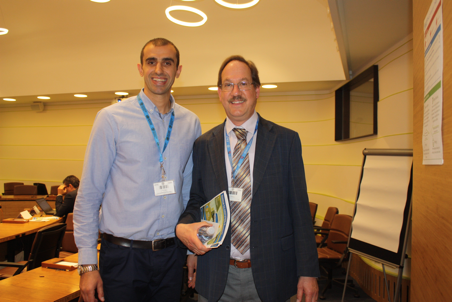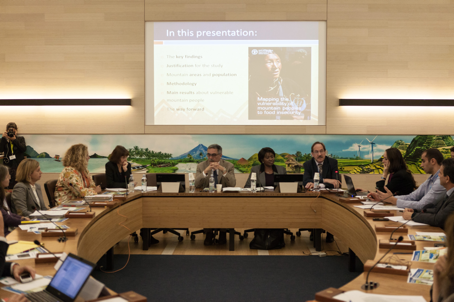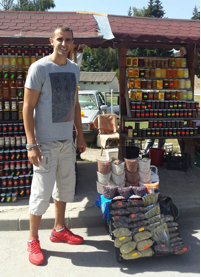Being on a track to graduate Utah Valley University (UVU), an incredible opportunity had opened up to me. At the beginning of January 2016 I became an intern at the Mountain Partnership Secretariat (MPS), a subdivision of the ‘Watershed Management and Mountains’ team of the Food and Agriculture Organization of United Nations (FAO-UN) in Rome, Italy. Prior joining MPS, I knew very little about its activities and functions. I had some previous involvement with this FAO-UN unit while working on hosting the Fourth International Women of the Mountains Conference in Utah because it was held under the umbrella of the Mountain Partnership (MP).
I have been already part of the MP for almost two months, and I was able to gain enough knowledge and understanding of how this subdivision works and contributes to the United Nations agenda on Sustainable Mountain Development (SMD). I would like to share my own perspective of this institution.
As a student and intern, I believe it is very important to acquire knowledge and gain experience about the range and depth of the issues that the Mountain Partnership is dealing with. For me and other students, the MP provides an enormous potential for networking and finding a niche for a future professional realization.
But what is the Mountain Partnership and what does it stand for? Simply put, it is a United Nations voluntary alliance of a numerous partners dedicated to improving the lives of mountain peoples and protecting mountain environments around the world. It is created in 2002 and supported by a Secretariat, hosted at FAO-UN, funded by the governments of Italy and Switzerland and the FAO-UN. Unfortunately, the Secretariat is a very small unit with just a few people working there. It is led by Dr Thomas Hofer, serving as a MPS Coordinator. He dedicates half of his time to the Secretariat and he also serves as team leader of the water management team in FAO which is very unfair.
The MPS coordinates 270 members in more than 80 countries. As of the end of February 2016, the Partnership consists of 57 governments, 14 intergovernmental agencies and 199 civil society NGOs. It serves as a networking point for its members. It also connects institutions and coordinates various SMD activities to ensure greater participation, understanding and impact. It is engaged in raising awareness and global recognition from policy making institution about the importance of the mountains and the challenges the mountain communities are facing. As I am coming from Bulgaria, a country located in the Balkans and covered by mountains, it is a pity that the government of my country is not a member. While I am serving as an intern here, one of my tasks would be to find a way to make sure my country sooner rather than later will join the Partnership. My aim is not only to help people from Bulgaria, but also people from the other mountain communities and to contribute towards a global sustainable mountain development. Meantime, my role as an intern is to contribute to the efforts of the people working at the Secretariat towards developing collaborative partnerships and establishing sustainable relationships.
In particular, the MPS plays a facilitating role in helping members to build and develop joint activities, promote closer collaboration, to achieve greater understanding and better results towards SMD. The work of the Secretariat is overseen by a Steering Committee which provides a programmatic guidance. It consists of 16 members, elected to four-year terms. So every action of the Secretariat is entirely synchronized with a previously implemented work plan.

(L to R) Yanko Dzhukev and Thomas Hofer, Coordinator of the Mountain Partnership Secretariat
(©FAO/Mia Rowan)
But why the mountains? 915 million people live in the mountains, which is 13% of the global population; 60 – 80% of global freshwater comes from mountains; 60% of all biosphere reserves are located in the mountains and 20% of the global tourism is based in the mountains. All looks great, but let me give you some disturbing numbers. According to a new study, completed by the Mountain Partnership and FAO, ‘Mapping the vulnerability of mountain peoples to food insecurity’, 1 in 3 people in mountains is vulnerable to food insecurity, and it gets worse – 1 in 2 people in rural mountains is food insecure. In the lowlands the picture is different – 1 in 8 people is exposed to hunger. In other words – the people in the mountains are extremely vulnerable to food insecurity.
The mountains are bounded to extreme poverty rates. And I am not talking about the Alps, Pyrenees, Apennines, or the Rocky Mountains. I am talking about the mountains in the developing countries, places where there are not any policies that look after the mountain people. Hunger, poverty, harsh conditions, human trafficking, drug smuggling, migration, are just of the few issues that the highlands’ communities are facing. The mountains are severely affected by the climate and global changes as well. Desertification and uncontrolled mining also become a huge issue. There is a lack of investments. The mountains simply do not have the “privileges” of the lowlands. There is an urgent need for action.
I would like to here to mention my home country as an example. Bulgaria, being a member of the European Union, along with Romania, is one of the poorest country in Europe. Counted as a developed state, it is far away from that point. No one pays attention but in many areas of Bulgaria, especially in the mountains, the people are living below the poverty like. They live in very harsh conditions and they are struggling to make an important transition to a market economy. I live in the foot of RIla Mountain, the highest mountain range in Bulgaria. I see people starving and in 21st century living without electricity and access to any kind of basic human amenities. The migration crisis in Europe is also a huge problem. Refugees headed to Western Europe are hiding in the Bulgarian mountains risking their lives and sometimes freezing to death.
One the other side, while I have been studying and living in Utah, I see completely different picture. Surrounded by the Rocky Mountains, Utah is one of the most developed mountain regions in the world. I believe that it is very important to take it as an example and try to apply it to other mountain regions around the world. For the Mountain Partnership it is very important to pay close attention to these developed mountain areas and to see what is done differently, how can this successful example can be implemented. Many companies and private institutions have the resources to contribute towards sustainable mountain development and apply their “know how”.

FAO meeting discussing problems of hunger in the mountains (©FAO/Mia Rowan)
From the point view of an intern, the Partnership so far has been doing a great job – promoting, advocating, mobilizing support from private sector, governments and NGOs. But there is a long way until reaching a complete global sustainable mountain development. The members are working extremely hard to make a significant difference on a local level but without any significant support from government and policy making bodies, it would be a lost cause.
As a student at UVU and a member of the organizing committee of the Fourth International Women of the Mountains Conference, I have paid very close attention to the MP before I have joined the Secretariat as an intern. This is why I would like to highlight some additional efforts by the MP. Some might think that the Secretariat’s only purpose is to carry the celebration of the International Mountain Day, but its work is organized around many more things. Along with the advocacy and communications, the Secretariat focuses on joint action and capacity development. It organizes courses, different seminars and workshops on SMD.
I was very impressed by one of the MP initiatives creating a global mountain label. It is a great initiative aiming to boost sustainable development in the mountain region. I believe that labeling the mountain products and uniting the small farmers could be a great strategy towards ensuring sustainability in the mountains. These are very high quality products. And I think they should receive the appropriate credit. I visited recently the Rodopi Mountains, located in southern Bulgaria. The taste of the mountain products I have tried is incomparable. The people in these regions are very poor, and they count a lot on these sales. These small mountain farmers cannot compete with the prices and volumes of lowland production, this is why they focus providing very high quality products to stimulate local economies.

Yanko Dzhukev in Rodopi Mountains,
Bulgaria (©FAO/Yanko Dzhukev)
Being the only organization whose entirely purpose is based on working towards sustainable mountain development, the Mountain Partnership fights on different battlefields. One of the important initiatives was the campaign for mobilizing support for the inclusion of the “mountains” in the Sustainable Development Goals. In September 2015, the Millennium Development Goals were replaced by a new set of United Nations global goals – the Sustainable Development Goals (SDGs). The Partnership focused all its efforts to make an impact and to have the three proposed mountain target adopted in the SGDs. It held a variety of initiatives and projects in the area of SMD. I, as a student and part of UIMF, was able to contribute to the efforts of the MP towards the sustainable mountain agenda. Starting at the beginning of June 2015 through the moment when United Nations Sustainable Development Summit 2015 in September, adopted the new SDGs, the coalition of students I was part of, attempted to reach out to numerous mountain related governments, organizations, individuals, and well-known mountain climbers. For that purpose I created a social media link – “Keep Mountains in the SDGs.” I contacted also the leaders of mountain nations and their Permanent Representatives to the United Nations urging them to advocate for keeping mountain indicators among the SDGs during the intergovernmental negotiations on the outcome of the document. I kept on pushing this very important agenda and urging for support, spreading this message because all of us, members of the UIMF, wanted to make a significant impact. Finally, when the three mountain indicators were adopted among the SDGs, it gave to us, and myself, satisfaction in knowing that we have fulfilled our obligation.
Later on, at the beginning of December, the Mountain Partnership once again showed its restlessness in effort to highlight the mountain regions during COP 21, also known as the 2015 Paris United Nations Climate Change Conference (UNFCCC COP21). The Partnership did the impossible to bring the mountainous communities and the effects climate change has on them for a discussion. It lead a global petition, requesting that during the UNFCCC COP21 new climate deal, the impact climate change has on mountain peoples and ecosystems is fully discussed. UVU once again showed its devotion and support by mobilizing students to sign the climate change petition. I, as a student and now as a part of the MPS, am very proud that through efforts of UVU students and partners in many part of the global mountainous world our team was able to mobilize more than 1,000 signatures from 6,283 gathered in total as a result of this campaign, ensuring that the impact of climate change on Mountain Peoples and Ecosystems is fully addressed in COP21.
In addition, every three years the Secretariat also produces the content for the UN Secretary-General report on sustainable mountain development (SMD), which describes the status of SMD at the national and international levels, including an analysis of future challenges. It produces a number of publications with a number of current and relevant very important for the mountain communities case studies based on contribution from MP members. These members bring lots of experience, knowledge and most importantly contact with the local communities.
I sincerely admire the people that work within the Secretariat. They are on a constant mission trying to make a difference, entirely dedicated in the bettering the lives of mountain peoples and advocating for SMD. What I can say from my experience, the Mountain Partnership is entirely devoted in working together with a common emphasis of achieving sustainable mountain development around the world, especially in the vulnerable regions in the developing countries. The MP works jointly together to engage the public and private sector’s attention, commitment, engagement and investments towards sustainable mountain development in order to maintain and improve the well-being and livelihood of the mountain communities. It works towards providing opportunities for the most vulnerable people and allowing them to fully participate in the decision-making process that determine their own future.
Yanko Dzhukev, Advocacy and Communications Intern, Mountain Partnership Secretariat, Food and Agriculture Organization (FAO) of the United Nations (UN)

